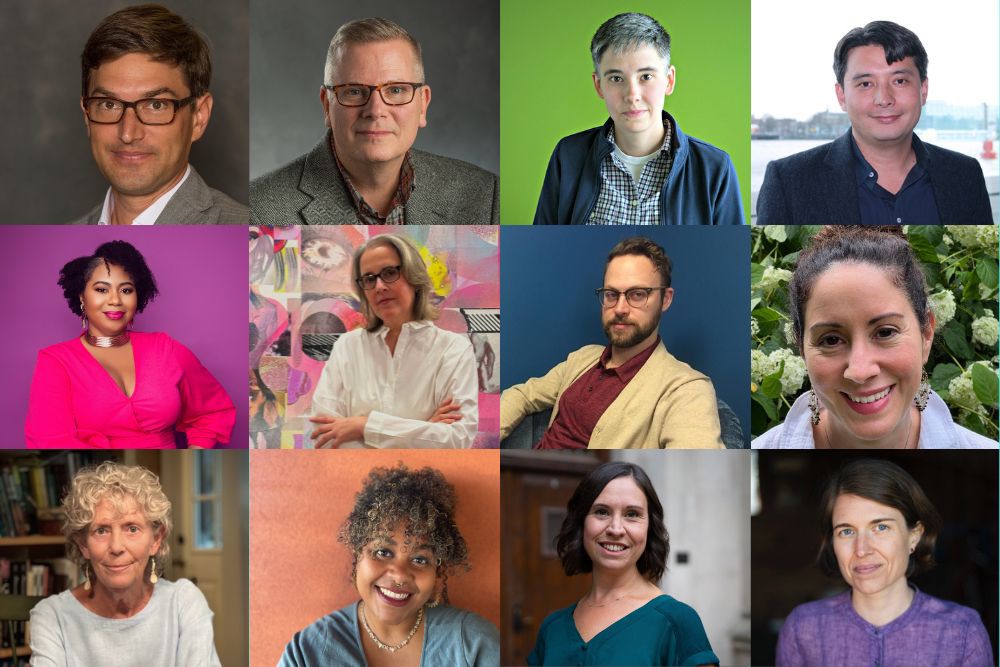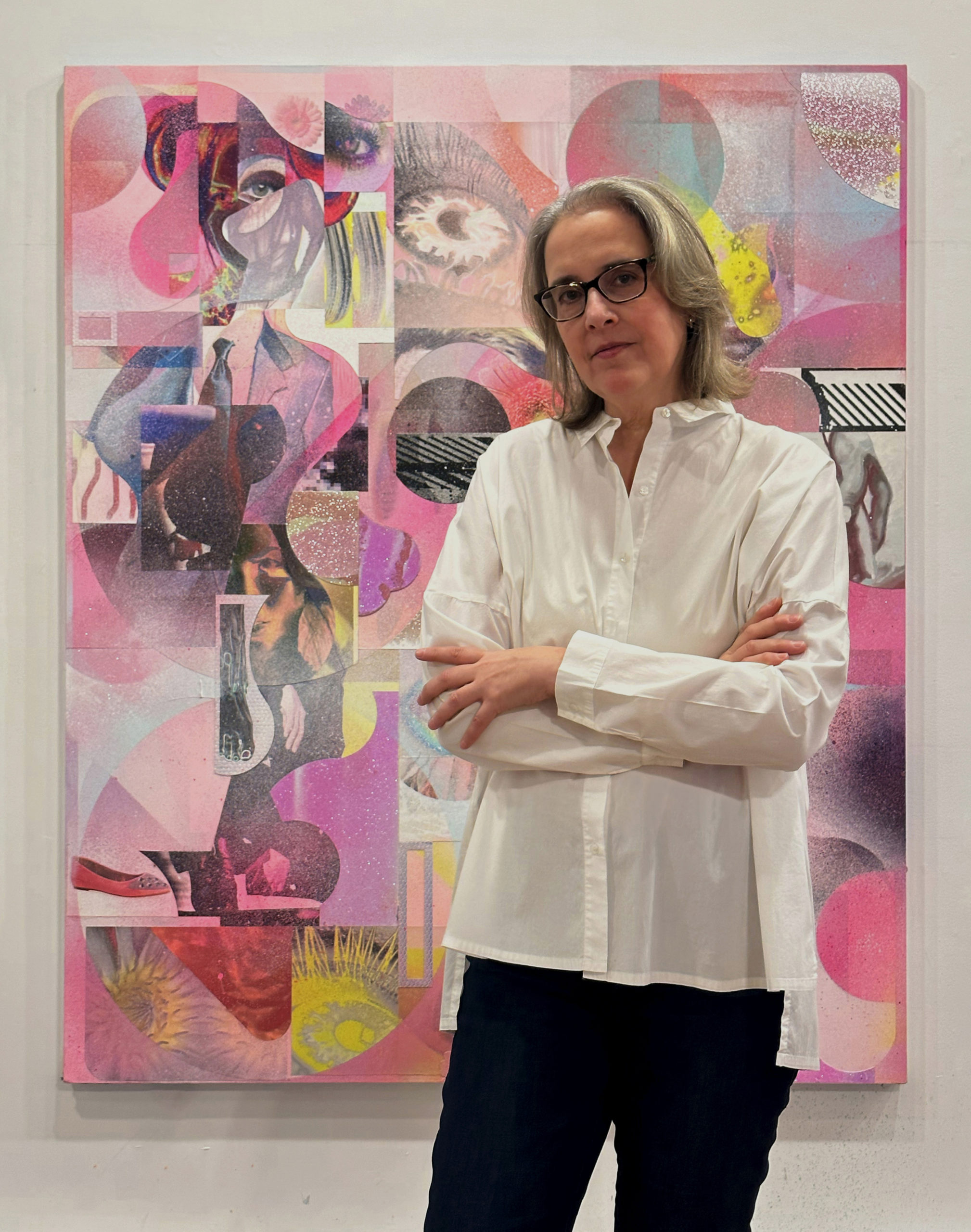Twelve College of Arts & Letters faculty members currently are working on projects supported by 2023 Humanities and Arts Research Program (HARP) Grants. The projects range from mixed media artwork and theatrical productions to the publication of books on a variety of topics including South African quilts and textiles, German migration history, and color cinema.

Six of the faculty members received HARP Development Awards, which grant up to $25,000 to support research leading to creative or performance-oriented projects or activities within the arts and humanities fields. The other six faculty members received HARP Production Awards, which are up to $7,000 to help subsidize the costs associated with a completed creative or research project, such as the cost of publishing a book, gaining copyright permissions, creating and mounting exhibits, or for CD production and recordings.
Funding for the HARP Grants is provided, in part, through the Michigan State University Research Foundation.
HARP Development Award Recipients
LeConté Dill

LeConté Dill, Associate Professor in the Department of African American and African Studies, is using the HARP Development Award to develop a play, titled Pregnant With Freedom, which conceptualizes dreamwork as practice spaces in which to metaphorically and literally birth, survive, and mother.
The play, the title for which is taken from the poem “Love” in the autobiography of freedom-fighter Assata Shakur, amplifies Black Feminist art and humanities as pathways to more nuanced narratives and wider conversations with diverse audiences around birth and labor, beyond survival, and toward reparatory and liberatory futures.
Through the rigorous analysis of Dill’s actual pregnancy dreams, Pregnant With Freedom seeks to integrate methodologies of Black ritual poetics, ethnodrama, autoethnography, and biomythography in order to offer an expansive and transformative playwriting form.
“I’m excited,” Dill said, “that I’m engaging with the craft of playwriting, performance rituals, and consideration towards bringing my creative work from the page to the stage.”
Alisa Henriquez

Alisa Heriquez, Professor of Painting in the Department of Art, Art History, and Design, received a HARP Development Award for her new body of mixed media artwork, titled History Reimagined: Abstracting Constructed Identity. The project explores the concept of constructed identity and history by layering personal and family narratives, including biological, cultural, and migration stories. By placing these narratives together, the project aims to delve into the complexities of identity and inherited versus constructed selves.
As narratives converge within the layered visual dialogue of Henriquez’s artwork, a transformative process will unfold, giving rise to novel abstract form and spaces that merge diverse elements. The abstract vessels of expression hold the purpose of vocalizing the intricate relationships between geography and identity. The series also illuminates the pivotal impact of privilege, violence, persecution, and displacement on the tapestry of family narratives that have been passed down.
“I hope,” Henriquez said, “to excavate and investigate the complex, visual, and conceptual possibilities that occur when placing various narratives and histories in the same pictorial space while grappling with the, at times, contradictory notions of the inherited and constructed self that emerge.”
Joshua Lam

Joshua Lam, Assistant Professor in the Department of English, is using the HARP Development Award for his manuscript, Creatures of Habit: Racial Automatons and African American Modernism. The project examines the historical connection between the automaton figure and racial anxieties in U.S. literature and culture from the mid-19th century to the modernist era (1890-1950).
The project theme explores how the automaton, representing involuntary actions, became intertwined with racial anxieties related to industrialization and modernity. The project also delves into the intersection of race and technology, unveiling how discussions about industrialization were shaped by racial perceptions, and also presents science fiction by Black writers, showing how they engaged with the automaton trope to challenge racial stereotypes and systemic injustices.
“The project shows how white novelists, scientists, and social critics depicted technology and automatic behavior in racial terms, fabricating an association between Blackness, slavery, and compulsive behavior to condemn industrialization,” Lam said. “The book then demonstrates how Black modernist writers like W.E.B. Du Bois, Pauline Hopkins, and Ralph Ellison contested these associations by resignifying images of mechanized Black bodies. Turning a figure connected with racist stereotypes into a powerful symbol of their own disempowerment, these writers reappropriate the trope of the Black automaton to criticize dehumanizing and exploitative practices, including slavery, pseudo-scientific racism, Jim Crow laws, and social determinism.”
Blake Williams

Blake Williams, Associate Professor of Ceramics in the Department of Art, Art History, and Design, received a HARP Development Grant for her project, Making Mends, which combines vintage textiles and ceramic sculpture to address intimate and profound themes of grief and healing.
Inspired by two deeply personal losses, Making Mends builds on those personal experiences of grief and healing to reach wider audiences, seeking the universally human through the profoundly personal.
Through this project, Williams expresses themes of loss, memory, and the power of making to heal in a layered combination of antique handmade textiles, those relics of family legacy and domestic craft, with intricate designs of interwoven porcelain fingerbones. She memorializes the losses of people close to her as a palimpsestic juxtaposition of old and new, presence and absence, loss and persistence.
“As a medium, clay has always offered proof of our global relatedness and our long-shared human story,” Williams said. “I contribute to that story by creating out of my own vulnerability, the place from which I reach out to others to tell my truths, secrets, and innermost thoughts. By making in this way, I am able to tap into and assert our common humanity. Our lives are messy, and so is much of our greatest art. In that very messiness, the private feelings that threaten to isolate us in pain and fear become the place to build new and stronger human bonds. By sharing my stories visibly through my artwork, I connect to others and invite collective, restorative growth and healing.”
Lily Woodruff

Lily Woodruff, Associate Professor of Art History and Visual Culture in the Department of Art, Art History, and Design, is using the HARP Development Award for her art historical book project, titled Spoils: Archiving the Anthropocene in Global Contemporary Art.
Based on a decade of studying international art exhibitions, speaking with artists, and reading in the field of ecocritical theory, the book explores how artists today are using archives and object collections of cultural institutions to refigure histories of Natural History and the Anthropocene with particular attention to the roles of colonialism, social movements for assertions of environmental sovereignty, and the financialization of natural resources.
Spoils explores how artistic approaches to the history of the Anthropocene construct models of ecotemporality at a moment when we are so uncertain of whether or not we will have a livable future. While one prominent model of ecoartistic production involves attempting to educate the general public and present models for sustainable living in the future, this book takes an interest in artistic production that examines the past to show the material histories of our current ideological formations.
“My book will bring this quality of sustained historical, political, and formal attention to artworks that reflect on and symptomatize our current material and ideological challenges,” Woodruff said. “My ambition is to find strategies for coping with the realities of environmental danger based in historical consciousness that is aesthetically and affectively attuned.”
Laura Yares

Laura Yares, Assistant Professor of Jewish Studies in the Department of Religious Studies, received a HARP Development Award to help support the work on her second book, provisionally titled Artful Education: How Jews and Non-Jews Learn about Judaism Through the Arts.
Utilizing data gathered from ethnographic studies of learning set across five different arts settings, the book will illustrate that the arts offer provocative spaces for learning about religion and religious themes. When viewers watch Netflix, see theatrical productions, visit museums, or listen to music, they are confronted with images of religious people, with the sounds of sacred languages, and with the words of religious texts.
The arts offer the opportunity for multicultural “travel” through which viewers learn about new cultures, new communities, new calendars, and contexts. Yares’ book focuses on learning about Jews and Judaism and on five case studies of artistic productions that engage Jewish themes and languages.
“Where do adults learn about religious traditions? What settings enable adults to encounter members of religious communities that are not their own? My HARP grant is supporting me as I write my second book,” Yares said. “It posits that for adult learners in leisure time, learning about religion occurs through engagement with the arts.”
HARP Production Award Winners
Kaveh Askari

Kaveh Askari, Professor and Director of Film Studies in the Department of English, will use the HARP Production Award to help cover the cost of publishing his book, co-written with filmmaker and curator Ehsan Khoshbakht, titled Searching for Filmfarsi.
The book, which is linked to film preservation and curation projects initiated by Khoshbakht and Askari, will serve as a reference book for popular Iranian cinema made before 1979. The project will showcase images from films, posters, and production stills that could not be published in contemporary Iran.
Askari’s research and teaching focus on cinema and media history in a global context with special areas of interest including art cinema, media circulation, film and the other arts, and cinemas of the Middle East.
“Iranian films made after the 1980s are well known around the world thanks to the film festival circuit,” Askari said. “The popular films made before 1979 are relatively unknown outside of a small circle who can access them. MSU’s support is crucial in making this body of work accessible and comprehensible.”
Yomaira Figueroa-Vásquez

Yomaira Figueroa-Vásquez, formerly Associate Professor of Race and Ethnicity in Global Afro-Diaspora Studies in the Department of English, [now Professor and Director of the Center for Puerto Rican Studies (CENTRO) at CUNY Hunter], used the HARP Production Award to support the publication of the Spanish translation of her first academic monograph, Diásporas decolonizadoras: cartografías radicales de literaturas Afroatlánticas.
First published in 2020 by Northwestern University Press, Decolonizing Diasporas was awarded the MLA Prize in Chicano/a Latino/a Literary and Cultural Studies and has been widely praised as the “lodestar by which [we] reconfigure Global Hispanophone Literatures” and as a book that “re-aligns whole fields of study.”
Through theories of decoloniality, women of color feminisms, and feminist philosophy the book focuses on the literary and cultural productions of the Hispanophone Caribbean and Equatorial Guinea and creates dialogues between the literary work emerging from the Spanish-speaking Caribbean (Latinx) and Spanish-speaking African (Hispanic) diasporas. The book is rooted in the histories and legacies of the Spanish colonial project and U.S. imperial expansion and is attuned to the perspectives emerging from these Atlantic islands. Translated and published by Editora Educación Emergente in Puerto Rico in August 2023.
“The HARP supported the production of the book,” Figueroa-Vásquez said, “which was especially important for a press like EEE, an emergent, radical, and rigorous independent press that has been publishing some of the most cutting-edge scholarly work in the Caribbean in the last decade.”
Marsha MacDowell

Marsha MacDowell, Professor in the Department of Art, Art History, and Design, is using the HARP Production Award to help cover the cost of publishing a manuscript that is the culmination of over 20 years of research. Titled Quilts and Related Textiles of South Africa, the project is an illustrated volume of more than 300 pages of South African art history and the connection that the textile art form has to diverse populations, political history, economic needs, and health pandemics.
MacDowell serves as the editor of the volume, author of the lead essay and four additional essays, and co-author of another essay. Her fellow essayists provide a diversity of perspectives – from artists, artists/activists, university-based historians and art historians, folklorists, textile specialists, community scholars, and curators based in both South Africa and the United States – thus providing a fulsome picture of this art.
“Currently, the published literature on South African quilts is primarily ‘how-to’ books or books that explore only the historical settler production of quilts or contemporary artists of colonial settler heritage, or the related textile work of Black South African women involved in craft-based economic development programs,” MacDowell said. “This will be the first book that provides a holistic look at the production of quilts and related textiles, showing the histories and linkages of art forms that have been essentially marginalized or ignored in the overall art history canons.”
Rob Roznowski

Rob Roznowski, Professor in the Department of Theatre, wrote a musical comedy, titled The STEAM Plays: Using the Arts to Talk About STEM, that focuses on how important creativity and artistic expression are to innovation in STEM (science, technology, engineering, and mathematics) fields and makes the case for STEAM (science, technology, engineering, arts, and mathematics) over STEM education.
Roznowski used the HARP Production Award for the production of The STEAM Plays and to take that production to several local elementary schools during the Fall 2023 semester and two free performances at MSU.
“This original musical (music and lyrics by Seth Burk) uses the arts to talk about STEM and offers fun and educational songs and sketches for the entire family,” Roznowski said. “In the writing process, I have gained a deeper understanding of how inextricably linked the arts are to science, technology, engineering, and math.”
Roznowski currently is working on a curriculum based on The STEAM Plays and will make it available to educators and schools that may wish to produce the play in the future. Also, a website is being worked on that will include this curriculum and The STEAM Plays script. The website will launch in the Spring 2024 semester.
Johanna Schuster-Craig

Johanna Schuster-Craig, Assistant Professor in the Department of Linguistics, Languages, and Cultures and in the Global Studies in Arts and Humanities Program, is using the HARP Production Award to publish her first book, titled One Word Shapes a Nation: Integration Politics in Germany.
The book is an extensive study covering seven decades of postwar German migration history with an exploration of how media scandals, migration history, and social work programming help shape how newcomers find their place in German society.
“One Word Shapes a Nation is a book about how contemporary media scandals about immigration in Germany are both rooted in historical events and fuel right-wing extremism,” Schuster-Craig said, adding that: “It has become much more expensive to publish books through scholarly publishers over the past two decades. Publication subsidies are now essential in the humanities to publish a book that is also affordable for general readers. I am grateful to have received the HARP Grant so that copies of my book about migration policy will be available to people at a price they can afford.”
Joshua Yumibe

Joshua Yumibe, Professor of Film and Media Studies in the Department of English, is using the HARP Production Award on the publication of a book, titled Global Film Color: The Monopack Revolution at Midcentury, which brings together 14 different essays on color cinema by a wide range of esteemed scholars from around the world. This collaborative peer-reviewed book will be published by Rutgers University Press in May 2024.
The book explores color filmmaking in a variety of countries and regions including India, China, Japan, Russia, and across Europe and Africa. Most previous accounts of color film have concentrated on early 20th-century color processes and Technicolor. Far less is known about the introduction and application of color technologies in the period from the mid-1940s to the 1980s, when photochemical, “monopack,” color stocks came to dominate global film markets.
“The HARP Production Grant is instrumental in the final stages of this edited collection that I completed this summer,” Yumibe said. “The book examines the predominant turn to color in global cinemas after World War II.”
The timing of this book publication fortuitously coincides with the upcoming exhibition sponsored by the Getty Foundation, Color in Motion: Chromatic Explorations of Cinema, at the Academy Museum of Motion Pictures, in Los Angeles scheduled for September 1, 2024, through February 28, 2025, for which Yumibe is an advisor.


